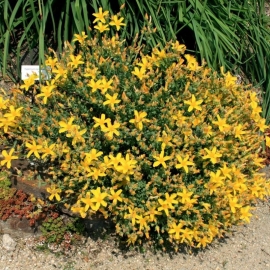


Organic St. John's Wort Seeds (Hipericum perforatum)
1.14 €
A perennial herb, up to 1 m high, with a rod, highly branched rhizome, is used to treat diseases of the gastrointestinal tract, nerves, joints, respiratory tract, skin diseases.
-
St. John's wort or perforatum / Hipericum perforatum
Perennial herb up to 1 m high with a highly branched rod-like rhizome. Stem erect, glabrous, branched at the top. Leaves are small, sessile, opposite with scattered translucent dots. The flowers are golden yellow, collected in a corymbose-paniculate inflorescence. Blooms in July-August; bears fruit in September.
Due to an unreasonable approach to procurement, the reserves of natural resources have sharply decreased. Therefore, it is recommended to grow it in personal plots. Sow seeds before winter (October) or early spring. When digging, it is necessary to add 3-4 kg / m2 of rotted manure and peat compost or 2-3 kg / m2 of nitrogen, phosphorus, potassium. Seeds are sown superficially, without embedding in the soil. The seeding rate is 0.3-0.4 g / m2 with a row spacing of 45 cm. However, it is better to grow St. John's wort seedlings in warm or cold greenhouses and ridges. The best results are obtained when growing seedlings in pots.
Plants tolerate transplanting well and you can get a harvest much earlier. In the first month, the seedlings need careful care, they are tender and develop very slowly. 1.5-2 months after the emergence of seedlings, the seedlings are fed with nitroammophos at the rate of 2 g / m2. During the growing season, it is necessary to carry out 3-4 weeding by hand. By the end of the first year, some specimens bloom, but abundant flowering is noted only at 2-3 years of age. With age, development and growth of plants, yield also increases.
In medicine, plant materials are used to treat chronic gastritis, enteritis, colitis, functional diarrhea, chronic pyelonephritis, catarrhal sore throat, stomatitis, trophic ulcers, burns, gingivitis, periodontal disease, simple vaginitis, acne, chronic suppurative otitis media, mastitis. , anemia, hemorrhoids, jaundice, migraine, hypertension, cough.
